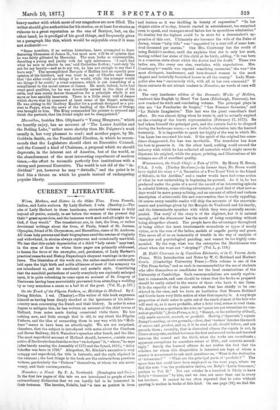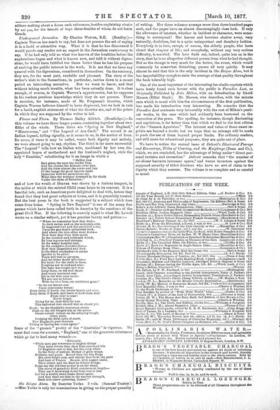M. Tullii Ciceronis in Q. Caeciliwn Divinatio, et in C.
Verrem Actio Prima. With Introduction and Notes by W. C. Heitland and Herbert Cowie. (Cambridge University Press.)—This volume is one of the "Pitt Press Series," and as such is recommended for the use of students who offer themselves as candidates for the local examinations of the University of Cambridge. Such recommendations are nearly equiva- lent to commands, and care should be taken that the books so prepared should be really suited to the wants of those who have to use them. It is the capacity of the junior students that has chiefly to be con- sidered in the case, and we have no hesitation that Messrs. Heitland and Cowie have very little notion of what that capacity is. A very large proportion of their notes is quite out of the reach of most of the lads who will read or, as is more probable, after a brief trial, refuse to road them. We shall give as a specimen the note on "quam iste per triennium ita vex- avit et prodidit " (A ctio Prima, c. iv .). Zumpt, on the authority of Guelf, only reads vastavit, vexavit, ac perdidit. Madvig (' Opuscula ') rejects Zumpt's reading, on two grounds,—first, that vastare 'denotes the result of vexare and perdere, and so, if it be read at all, should follow, and not precede them ; secondly, that in rhetorical climax the copula is not, in Cicero at any rate, omitted between the first and second verbs and inserted between the second and the third, when the verbs are co-ordinate ; apparent exceptions he considers errors of MSS., and corrects accord- ingly." Surely the learned editors do not realise the fact that the scholars for whom this disquisition is intended are boys of whom a master is accustomed to ask such questions as, " What is the derivation of triennium ?' " "What are the principal parts of prodidit ?' " The space thus lost could have been employed on the next page, where we find the note "on the predicative dative, see Roby's 'Latin Grammar,' preface to Vol. II." Not one scholar in a hundred is likely to have Roby's " Grammar " by him, and we fear, not more than one in every ten teachers. It cannot be too often repeated that to refer without quoting is useless in books of this kind. On one page (82) we find the editors making about a dozen snob references, besides explaining denim by sal rcp, for the benefit of boys three-fourths of whom do not learn Greek.



































 Previous page
Previous page